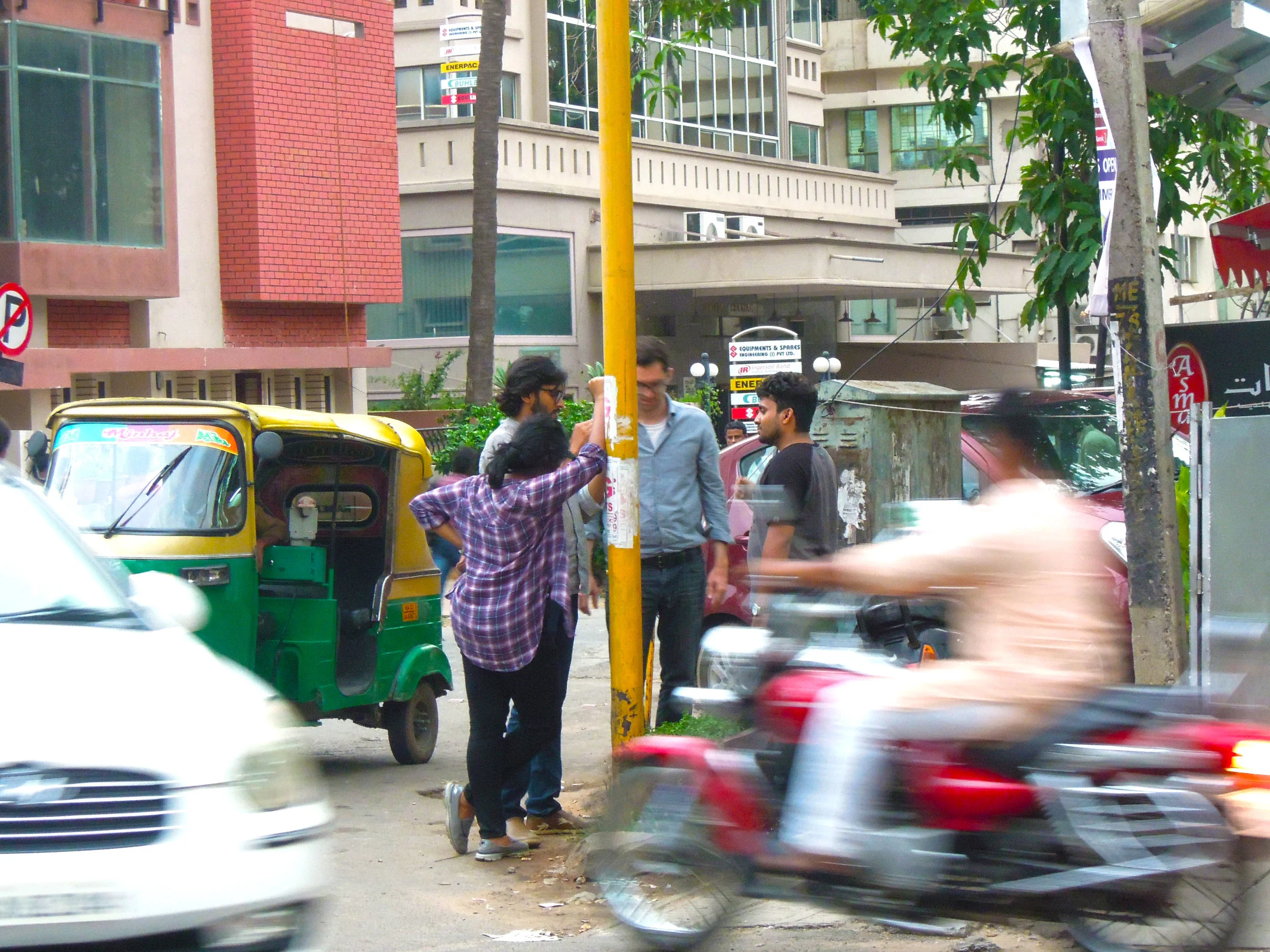Working in a recent visiting artist position at Graceland University, Commonstudio co-founder Kim Karlsrud completed a three month landscape installation, entitled “Large and Round When Popped” for the Constance Gallery in the Helene Center for the Visual Arts (October 2019-Febuary 2020).
Commonstudio’s Kim Karlsrud celebrates the opening of a group exhibition in Ann Arbor, MI.
We are thrilled to announce the recent completion of “Mow Town” an interactive storymap which explores the emergence and management of spontaneous urban vegetation in the city of Detroit.
Update on our recently built “Model Nallah” at Sowl lake! The current configuration compares the performance of terracotta rubble to granite gravel aggregate in the treatment of real urban wastewater from the surrounding city. Recently our team introduced dozens of Canna Lilies (Canna indica) into the system to assess planted vs. non-planted performance characteristics. It will also anticipate the possibility for multi-functional benefits of STRAINS interventions, capable of providing a range of visual interest and ecosystem services when introduced into open drains throughout the city.
Commonstudio Founders Kim and Daniel in collaboration with Firat Erdim, will be facilitating a three day workshop with 80 undergraduate architecture students at Iowa State University’s College of Design. Drawing upon insights from an ongoing experimental intervention currently in development in the periphery of Rome, the workshop is entitled Depaving Des Moines: Catalysts for Landscape Change in the Urban Watershed. Over the course of three days, students will be introduced to various landscape methodologies and have a unique opportunity to get their hands dirty in the field with a live de-paving demonstration project within the Fourmile Creek watershed of Des Moines.
Fast Track grant will enable cross-city research project to be added to UofM’s massive herbaria collection.
Bangalore, India. The Pollination Project, a nonprofit foundation that gives $1000 a day, every day, to individual change-makers and activists worldwide, awarded a grant to Commonstudio founders Daniel Phillips and Kim Karlsrud, creator/founder of Strategic In-Stream Systems (“Strains”) Project.
The project proposes small-scale, low-tech, in-stream decontamination strategies to be deployed and monitored throughout three distinct urban watersheds in India over the course of 4 years. Our interdisciplinary team is already engaged in ongoing schematic design, lab-based material testing, and relationship building with local partners. The STRAIN System is a modular system comprised of three basic stages aimed at 1) diverting and collecting solid waste 2) slowing and and settling sediment and suspended solids, and 3) lowering BOD, and trace metals levels through bio filtration using locally available aggregate materials. Our initial findings demonstrate that these systems can be deployed and scaled at a low cost with an immediate positive impact on localized water quality.
We would like to thank the founders and committee members of the Pollination Project, for believing in our work and the impact on the urban watershed in Bangalore. This grant will help acquire much needed materials for our pilot project, due to begin construction in early 2018.
The Pollination Project gives seed grants to projects that benefit people, the planet, and animals in areas like environmental sustainability, social justice, community health and wellness, arts, and education. To view a full list of recipients to date please see: https://thepollinationproject.org/
Commonstudio founders Daniel and Kim were honored to participate in ATREE's "Annual Work Seminar." We had a chance to present the current stage of our ongoing collaborative work with Dr. Priyanka Jamwal. As was the case throughout the last year of applied research It was refreshing and exciting to be surrounded by such great scientific thinkers who help us push beyond our blind spots as designers.
We are honored to have been awarded a microgrant from the Awesome Foundation (link to our project on their website, click HERE.
The $1000 Awesome Without Borders microgrant will contribute to the implimentation of a small scale intervention for the STRAINS system (currently in development with our Indian partner organizations). The intervention comprises of a designed structure which contains roughly 15 cubic meters of terracotta fragments. Terracotta is abundantly available and our preliminary research shows that it promotes the growth of biofilm, settles sediments, and reduces harmful pathogen content from black and greywater. The intervention will employ these fragments as a passive filtration material and substrate for the growth of spontaneous wetland plants over time. Working together, these systems will help lower the concentrations of harmful contaminants flowing through the watershed.
The Nallah we have chosen for the intervention is upstream of Sowl Lake in Bangalore’s southeastern periphery. Sowl is a perfect context as it is currently in the process of being revitalized and contains a series of preliminary filtration mechanisms. Our Strains unit will work in tandem with these other efforts already underway.
Funding will help purchase raw materials necessary to implement a small scale “proof of concept." Luckily, $1000 stretches much farther in the Indian context and will allow us to procure roughly 6 times more materials than if we were working in the US or EU. Demonstrating success at Sowl will help us garner more funding and support to scale this idea strategically throughout Bangalore and beyond. The goal is not commercial viability but open-source empowerment.
Probing the urban wilds of Bangalore with a local team of citizen scientists in search of the hidden behaviors and virtues of spontaneous vegetation.
Taking a closer look at the feral urban ecologies that thrive in India's "Garden City."










![AWS_Proceedings_2017[15240] 1.jpg](https://images.squarespace-cdn.com/content/v1/528a7be4e4b08fd3acec9867/1507348205114-2UTXEFNXF4P0J9EGATTN/AWS_Proceedings_2017%5B15240%5D+1.jpg)




